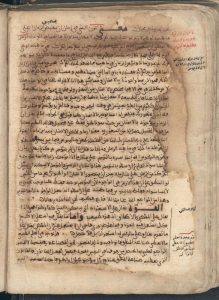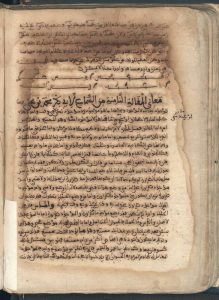

Ibn Bāǧǧa
The project conducted by the Thomas Institute of the University of Cologne concentrates on Averroes’ commentaries on Aristotle’s physical works. In order to provide critical editions of these philosophical works, the project aims at highlighting the historical context in which those texts have been produced. The goal is thus to place Averroes’ works in the Andalusian context of their genesis and to offer a direct access to what is one of their main sources, in addition to the Aristotelian text: the commentaries of Ibn Bāǧǧa.

Ibn Bāǧǧa (Zaragoza, ca. 1075 – Fez, 1139), a philosopher, a polymath and a statesman, known in the Latin world as Avempace, is one of the main representatives of the falsafa in the Muslim West. Familiar with the Greek tradition of Aristotle’s commentators, and in particular with the works of Alexander of Aphrodisias, Themistius and Philoponus, he is the author of several commentaries on Aristotle’s books in the field of logic and natural philosophy, as well as other later works, in the domain of ethics and political philosophy: The Rule of the Solitary and the Epistle of Conjunction of Intellect with Man. Hailed by Maimonides, in his letter to Ibn Tibbon – along with Alexander of Aphrodisias, Averroes and Fārābī – as one of the authorities one has to read before engaging in the philosophical curriculum and in the study of Aristotle’s work, he can rightly be considered as one of Averroes forerunners. Studies have shown the major influence he had, not only on Averroes’ Short Commentaries, but also on the genesis of his later works (Lettinck, 1994; Puig, 1996). Thus, although Averroes only cites Ibn Bāǧǧa when he distances himself from him and associates him almost systematically to interpretations he rejects, it is possible to show his importance even in the genesis of Averroes late works. Despite the fact that Ibn Bāǧǧa’s works have not been translated in the Middle Ages, unlike those of Averroes, they were known by Jewish and Latin milieus through Averroes’ critical quotations. This is how Ibn Bāǧǧa is supposed to have exercised a crucial influence on the construction of the “new physics” and especially of the modern dynamics (Moody, 1951; Franco, 2004).
The project intends to provide a critical edition of three of Ibn Bāǧǧa’s commentaries, on the Physics, on the treatise On the Generation and Corruption and on the Meteorology. Critical editions of these Arabic works have never been produced and are nevertheless necessary preliminaries to establishing the Arabic and Hebraic texts of Averroes’ Short Commentaries to these works, which is the core of our project. We endeavour to make one of Averroes’ most important sources available to the modern reader. This enterprise has an undisputable significance for the history of philosophy: the critical edition of Ibn Bāǧǧa’s works is fundamental to assess the general philosophical influence of Ibn Bāǧǧa on Averroes, and through him on the Hebraic and Latin posterity. In that it establishes a reliable text, our work will constitute the basis of more systematic studies on Ibn Bāǧǧa’s influence on Averroes and on the beginning of modern science. Besides, it will strongly contribute to the yet to be written history of the Arabic reception of Aristotelian natural philosophy.

The Averroes Project will produce critical editions of Ibn Bāǧǧa’s works, taking into account their highly complex textual situation and their conditions of transmission. It will thus go further than the pioneer works conducted by P. Lettinck (1994, 1998) and J. Puig (1995), which only allow a first approach of these texts. In doing so, we would like to deal with a part of Ibn Bāǧǧa’s work that has been neglected by modern studies. During the last decades, researchers have only focused their attention on the theory of intellect and on political aspects of Ibn Bāǧǧa’s works, probably because they were influenced by a prejudice according to which only the last works of Ibn Bāǧǧa are authentically philosophical. Nevertheless, as a recently published work of D. Wirmer (2014) has shown, it makes no sense to distinguish between Ibn Bāǧǧa’s commentaries on Aristotle – supposedly deprived of originality – on the one hand, and his independent and properly philosophical works on the other hand. To put it in a nutshell, Ibn Bāǧǧa broadly shares with Averroes and the Peripatetic tradition the idea that commenting on Aristotle really is to engage in philosophy.
Bibliography
Franco (2004), Abel B., “Avempace, Projectile Motion, and Impetus Theory,“ in: Journal of the History of Ideas (2004), 521–546.
Lettinck (1999), Paul, Aristotle’s Meteorology and its Reception in the Arab World. With an Edition and Translation of Ibn Suwār’s Treatise on Meteorological Phenomena and Ibn Bājja’s Commentary on the Meteorology, Leiden 1999.
Lettinck (1994), Paul, Aristotle’s Physics and its Reception in the Arabic World. With an Edition of the Unpublished Parts of Ibn Bājja’s Commentary on the Physics (Aristoteles Semitico-Latinus 7, Leiden 1994.
Moody (1951), Ernest A., “Galileo and Avempace. The dynamics of the leaning tower experiment”, in: Journal of the History of Ideas 12 (1951), 163–193; 375–422.
Puig (1995), Josep (éd.), Avempace. Libro de la generacion y corrupction (Pensamiento islamico, 4), Madrid 1995.
Puig (1996), Josep, “Ensayo sobre el pensamiento de Avempace y su repercusión en Averroes”, in: Anaquel de estudios 7 (1996), 241–261.
Wirmer (2014), David, Vom Denken der Natur zur Natur des Denkens. Ibn Bāǧǧa’s Theorie der Potenz als Grundlegung der Psychologie, Berlin – Munich – Boston 2014.